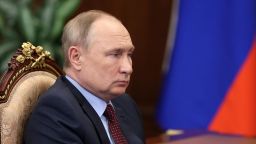US President Joe Biden said on Thursday that NATO would respond if Russia used chemical weapons in Ukraine, and has previously warned that Moscow would “pay a severe price” if it did so.
The use of such weapons against Ukrainian people would mark a dramatic escalation to Russia’s invasion, and would likely demand heavy retaliation from the West.
But concerns have been growing that Russia may be planning to take the step, after the Kremlin planted the unsubstantiated idea that Ukraine and the US may use these weapons. “It’s a tell that they themselves may be preparing to do so, and then trying to pin the blame on someone else,” US national security adviser Jake Sullivan said earlier this month.
Why would their use be so significant?
Chemical weapons contain toxic substances designed to cause death or harm to their targets. They can spread dangerous chemicals including choking, blister and nerve agents, which can attack the body and cause death on a vast scale, indiscriminately and across a wide area if they are deployed inside a bomb or an artillery shell.
Their use is banned by international law. Russia has signed those treaties and claims it doesn’t have chemical weapons, but the country has already been linked to the use of nerve agents against critics in recent years. Those cases include the poisonings of Sergei Skripal and Alexey Navalny.
Their prohibition stems from a painful history.
The use of chemical agents including chlorine, phosgene and mustard gas was one of the horrors of World War I and was responsible for nearly 100,000 deaths, according to the United Nations. In response, the Geneva Protocol, which banned chemical weapons attacks, was drawn up and signed in 1925.
Nonetheless, as many as 25 countries worked to develop chemical weapons during the Cold War, according to the United Nations’ Office for Disarmament Affairs. Lengthy negotiations eventually led to the adoption of the Chemical Weapons Convention (CWC), which entered into force in 1997, requiring nations to destroy their stockpiles and prohibiting the development, production or use of chemical weapons.
There have, however, been limited occasions in which they have been used in combat – and those occasions have led to political fallout around the world.
Former Iraqi dictator Saddam Hussein used a variety of chemical weapons against Iran during the 1980s, and their use in Syria over the past decade brought the threat of US intervention in that country’s civil war.
Attacks in Ghouta in 2013 and in Khan Sheikhoun in 2017 both involved the alleged use of sarin gas, a nerve agent banned under the CWC.
In 2013, the use of the gas, reported by United Nations investigators, crossed one of then-President Barack Obama’s self-declared red lines – yet no military action came.
Instead, the Organization for the Prohibition of Chemical Weapons (OPCW) went into Syria to monitor the destruction of the country’s chemical weapons program.
Warnings to Russia
While Biden’s declaration may conjure memories of Obama’s ill-fated “red line” warning in 2013, the current US President has a united NATO on his side.
On Thursday, NATO Secretary General Jens Stoltenberg said the alliance would reinforce its chemical, biological and nuclear defense systems amid fears over Russia’s intentions.
In a joint statement Thursday, the leaders of the G7 warned Russia against the use of chemical, biological or nuclear weapons.
“Any Russian use of chemical or biological weapons “would be a breach of all rules, all agreements and all existing conventions,” German Chancellor Olaf Scholz added. “We can only say: Don’t do it!”


